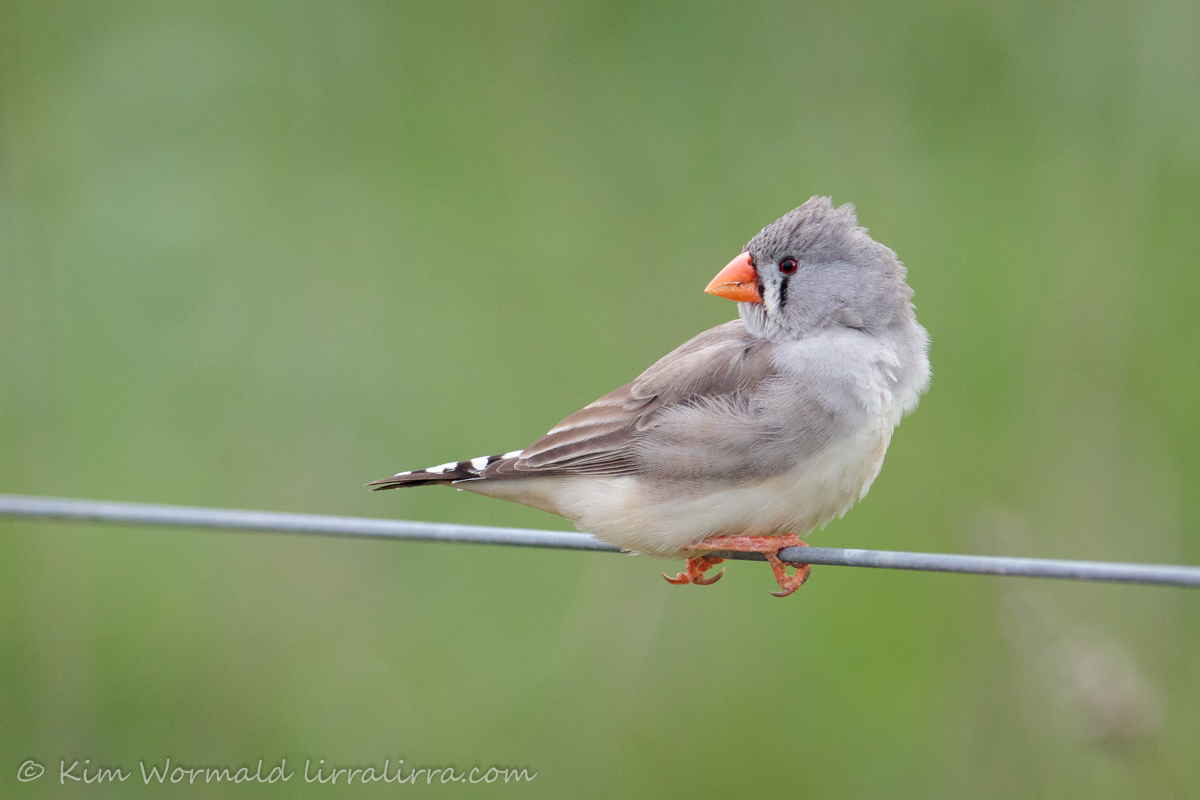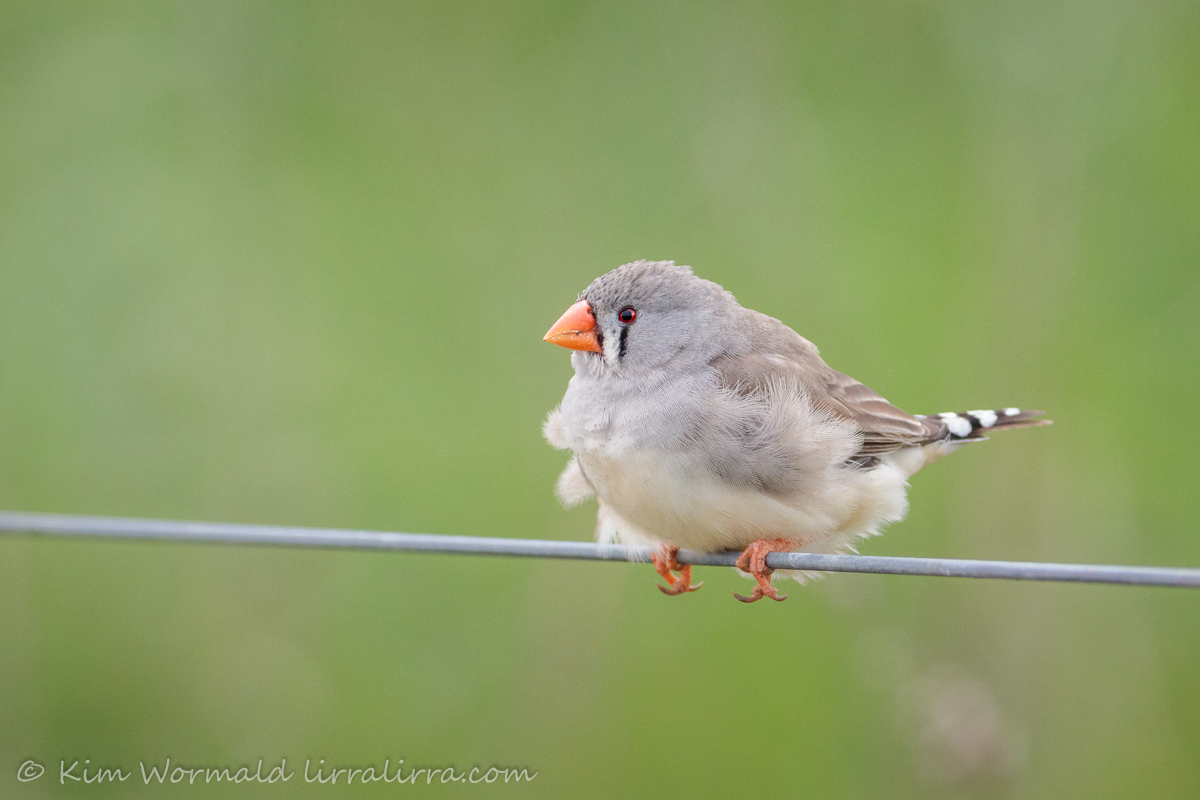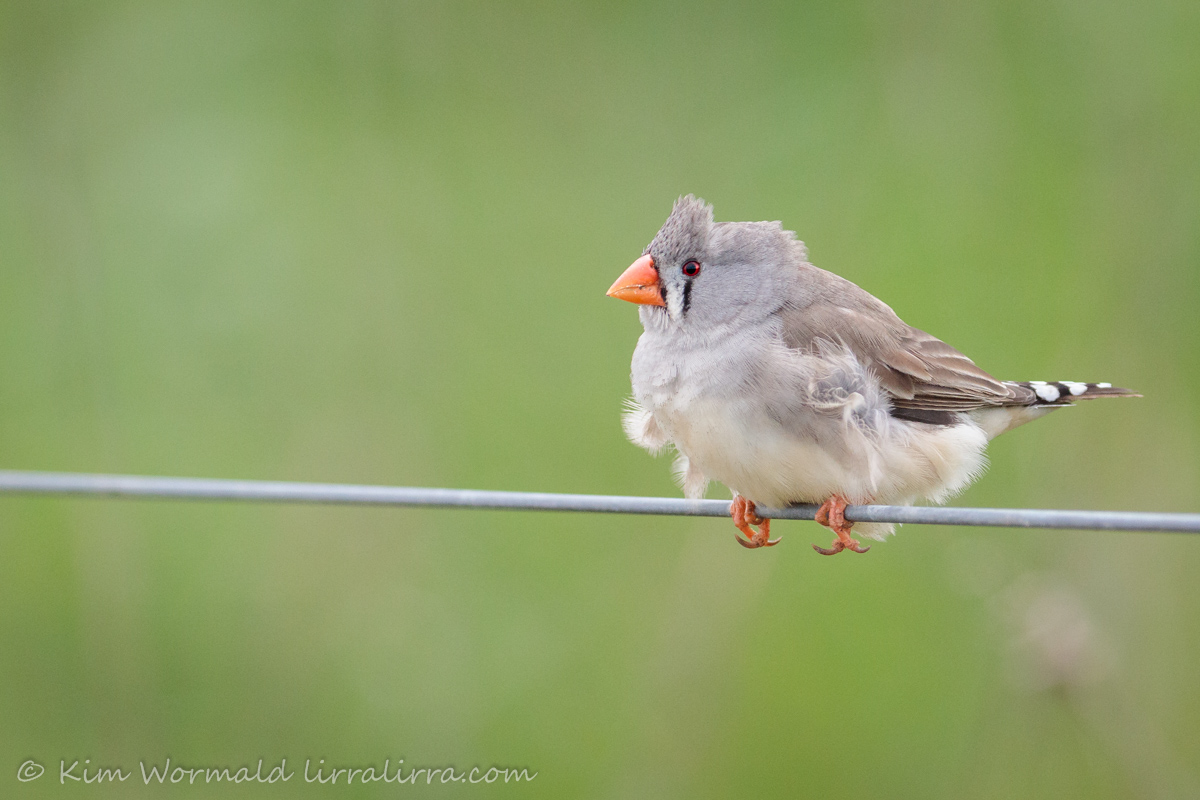When I first saw Zebra Finches in the wild it was in the Red Centre, they were surrounded by red rocks and red dirt and they looked perfectly at home. Seeing them at the Western Treatment Plant surrounded by green grasses still seems a little odd.
Zebra Finch (Taeniopygia guttata) – female
1/1250, f/6.3, ISO 1600
This week I’m sharing a little series of this female Zebra Finch perching on one of the many wire fences at the poo paddocks, with her feathers affected by the breeze.
These finches are about 12g and measure about 12cm. Remarkably, they can reproduce after about 10 or 11 weeks of age, which gives them a place in the record books as one of the speediest bird species to reach sexual maturity.
Zebra Finch (Taeniopygia guttata) – female
1/1250, f/6.3, ISO 1600
Male Zebra Finches have bright orange cheek patches and orange flanks with white spots. They can be seen in the ancient lirralirra post: Little Aussie Zebras
In more arid areas, including the Red Centre, I’ve seen these finches in large, noisy groups; at the WTP I’ve only seen them in extended family groups.
Zebra Finch (Taeniopygia guttata) – female
1/1250, f/6.3, ISO 1600
The crested Zebra Finch, above, is a rare species that only appears on windy days.
I recently read a fascinating article about Zebra Finches singing songs to their unhatched eggs on days with high temperatures. Dr Mylene Mariette, Deakin University, studied the phenomenon and discovered that the song impacts the growth of offspring and increases the number of fledglings they in turn raise as adults: maybe this will help the species cope with climate change.
Happy birding
Kim
Link: Zebra Finch call prepares their eggs for climate change
~ thank you for visiting and commenting
~ if you would like to join the subscribers who receive a weekly email letting them know when lirralirra has been updated please use the ‘subscribe’ box above right




Wow that’s so interesting! Such cute little tufty things
Especially tufty when the wind was blowing across the paddocks, and yes, definitely fascinating research!
[…] Last week I talked about how Zebra Finches sing to their unhatched young in such a way that their offspring might be better able to cope with climate change. Several readers requested more information and Jacob sent a beaut link that I have added to the end of last week’s post: WTP Zebra Finch […]
we used to raise zebes and I love your wonderful shots of them here!
Thank you Cloudia, I hope these little zebras brought back some happy memories
Hello!:) Wow! what a charming little bird, that sings to it’s eggs. I’ve heard of some expectant mothers singing to their unborn child, but never a species of bird. Lovely to know about, and your photos of this cutie pie are gorgeous.
That is a lovely thing to think about, maybe we’re more like birds than we realise
My Mom had zebra finches as pets for years and still loves to hear their little songs and meep meeps. Love that rare crested one though! LOL
They have such a distinct call, I’d usually miss them altogether if I couldn’t hear them. I’m glad you like the rarity
Thanks Kim. Beautiful photos and very interesting post. here is an article about the finches I found: http://www.sciencemag.org/news/2016/08/video-zebra-finch-call-prepares-their-eggs-climate-change
Thanks.
Thanks for sending the link Jacob, the animation is great too, much appreciated. It’s a fascinating topic and makes me think about all the secret bird-business that goes on of which we are completely unaware.
I have observed quite a few Superb Fairy wrens breeding outside my house. I sat next to the nest and watched them closely. A few days before the eggs hatch, the parents and some of the other birds in the clan come and teach the babies in the eggs what their particular song is. I know exactly when the birds hatch, the clan sits in the shrubs close by and call out to the hatchlings. It is important to recognize who their family is. That’s how the wrens teach the young. They also use that same call, that is different from other clans , to tell them when they are coming to bring food.
I would suspect , it is the same with Finches.
That sounds like an amazing opportunity to commune with nature Marie-Louise, especially that the birds were used to you and comfortable to have you around. I remember a study about fairy-wrens teaching their unhatched offspring a special call to use when begging for food which means that their nests are virtually ignored by cuckoos. There is so much we don’t understand about animal language. The Zebra Finch calls have been found to have considerable impact on different aspects of their lives, I’ll post a link in the article that might interest you.
Lovely pics. Kim. It is amazing what birds visit Werribee. We are so lucky.
That’s so true Joyce, it’s a wonderful place, I like how we can never be sure what we’ll see. I hope you’ve had the chance to visit recently.
Lovely story Kim. We saw our first Striated Pardalote today, busily gleaning cobwebs and unwary spiders from our window screens. Such a tiny bird but exquisite with its red wing dot.
Pardalotes are stunningly beautiful, like flying jewels. How beautiful to be able to watch them help clean your windows.
I’m interested by the article you read about the finches singing to the eggs. Can i get a link to the article as well?
I was interested by your comment and wanted to understand it…you said it increases the numbers of fledgling they raise…does that mean it increase the hatching success??
Thanks..
Hi James, yes, that’s right about hatching success. Here’s Jacob’s link: http://www.sciencemag.org/news/2016/08/video-zebra-finch-call-prepares-their-eggs-climate-change I’ll track down the others and will include them if they add anything to the story.
Love the middle pic!
middles are often gorgeous
What an absolute charmer – even on a bad feather day.
Have you got a link to that article? I am intrigued by the thought of birds singing to their eggs.
I should have added a link EC but I was running short on time, sorry about that. Here’s the link that Jacob posted above, it’s a beauty: http://www.sciencemag.org/news/2016/08/video-zebra-finch-call-prepares-their-eggs-climate-change